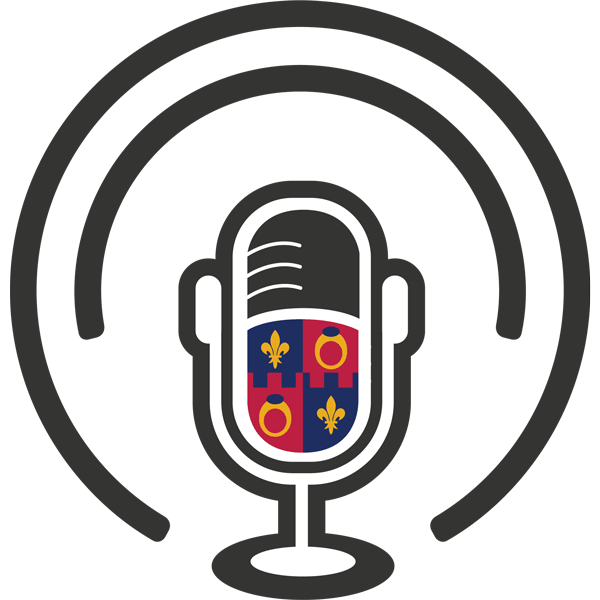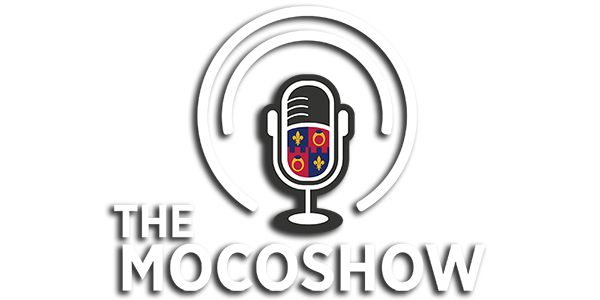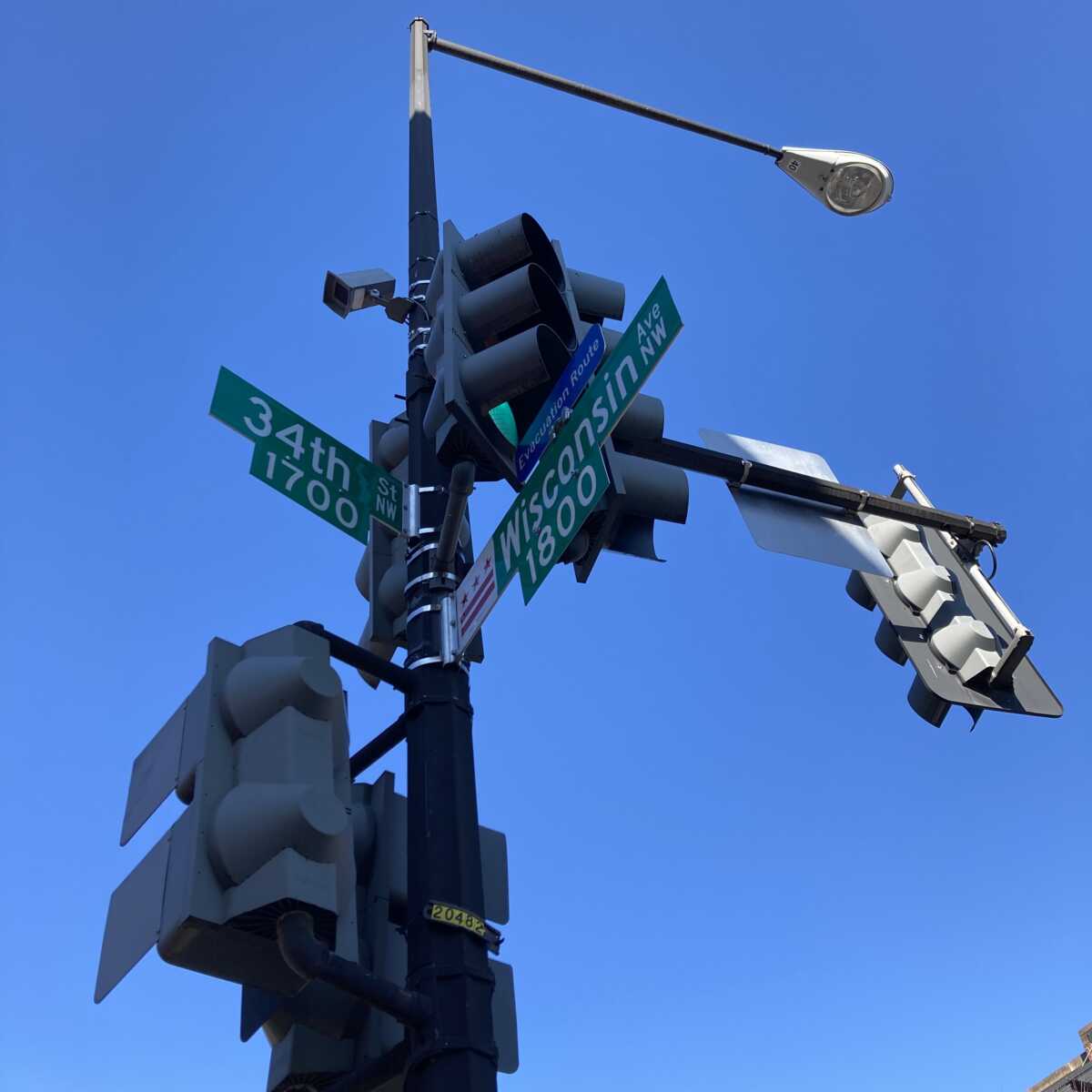
The Metro Transit Police Department is investigating a stabbing where one victim was critically injured Saturday evening.
Police and the District of Columbia Fire and Emergency Medical Services Department responded to a Metrobus stopped at the intersection of Wisconsin Avenue NW & 34th Street NW around 5:45 Saturday evening. One man was transported to an area hospital with injuries believed to be critical, according to the Transit Police.
Several Metro Transit Police units remained on scene with the bus for several hours Saturday; further details could not be immediately confirmed.
Part of multi-billion-dollar capital investment in 2022
As Metro prepares for the opening of both the Silver Line Extension and Potomac Yard Station in 2022, the transit authority will also advance its intensive state of good repair program. This includes completion of the multi-year platform reconstruction effort at 20 outdoor rail stations and several large-scale construction projects, including a major rehabilitation of the Yellow Line’s Potomac River tunnel and bridge crossing.
Metro will soon introduce new service on the Silver Line – including six new rail stations, 12 miles of track, and a new rail yard. And this summer, platform reconstruction and station improvements will be underway on the eastern end of the Orange Line.
In September, the construction of new tracks to connect the future Potomac Yard Station to the mainline tracks will be completed, along with performance and safety testing required prior to the start of service. The station is expected to open this fall.
A major rehab of the Yellow Line tunnel and bridge will begin concurrently in September. Metro’s chief engineer has identified the steel-lined tunnel near L’Enfant Plaza as the agency’s top structural priority, with repairs needed to stop water intrusion and strengthen the tunnel lining. Metro will also remove and rewire miles of critical communications cabling used by multiple jurisdictions and make repairs to the Yellow Line bridge. The project and associated bridge closure is expected to begin in September and be completed in spring 2023.
“In order to maintain a healthy system, Metro needs an aggressive capital program. We will continue working with our regional partners to advance construction and rehabilitation projects that ensure a state of good repair for critical regional infrastructure. While service outages can be disruptive, we know they are foundational for maintaining safe and reliable service,” said Metro General Manager and Chief Executive Officer Paul J. Wiedefeld. “We have a lot of work to do this year and we will tackle major state of good repair projects while also introducing new service. We are committed to providing our customers with reliable alternatives and frequent updates on the work as it is conducted.”
The capital project schedule for 2022 includes the following projects with rail service impacts:
- Platform Improvement Project, May 28 – Sept. 5, 2022*: New Carrollton, Landover, Cheverly, Deanwood and Minnesota Ave stations will be closed with no rail service. Free shuttle bus service will be available at the five closed stations. Stadium-Armory Station will be the eastern terminus of the Orange Line during this time.
Metro will demolish and reconstruct the aging concrete platforms at three outdoor stations — New Carrollton, Landover and Cheverly. Two adjacent stations – Deanwood and Minnesota Ave – will also be closed during this time and will receive upgraded safety and customer experience improvements. Taking advantage of the shutdown, at the same time aerial structures will be repaired and strengthened at numerous locations in the area. Learn more about the project and summer 2022 travel alternatives, and sign up for updates at wmata.com/platforms.
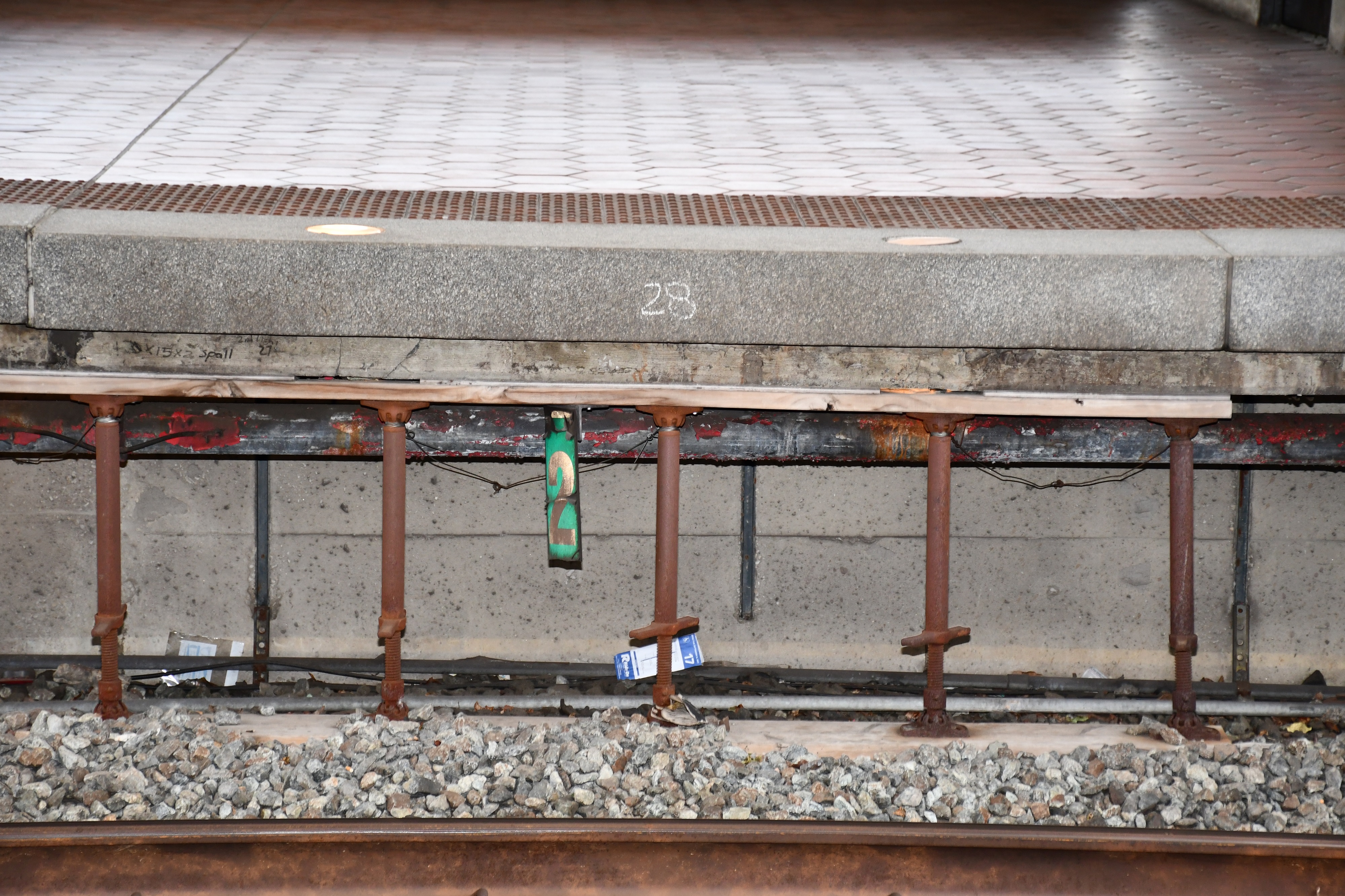 |
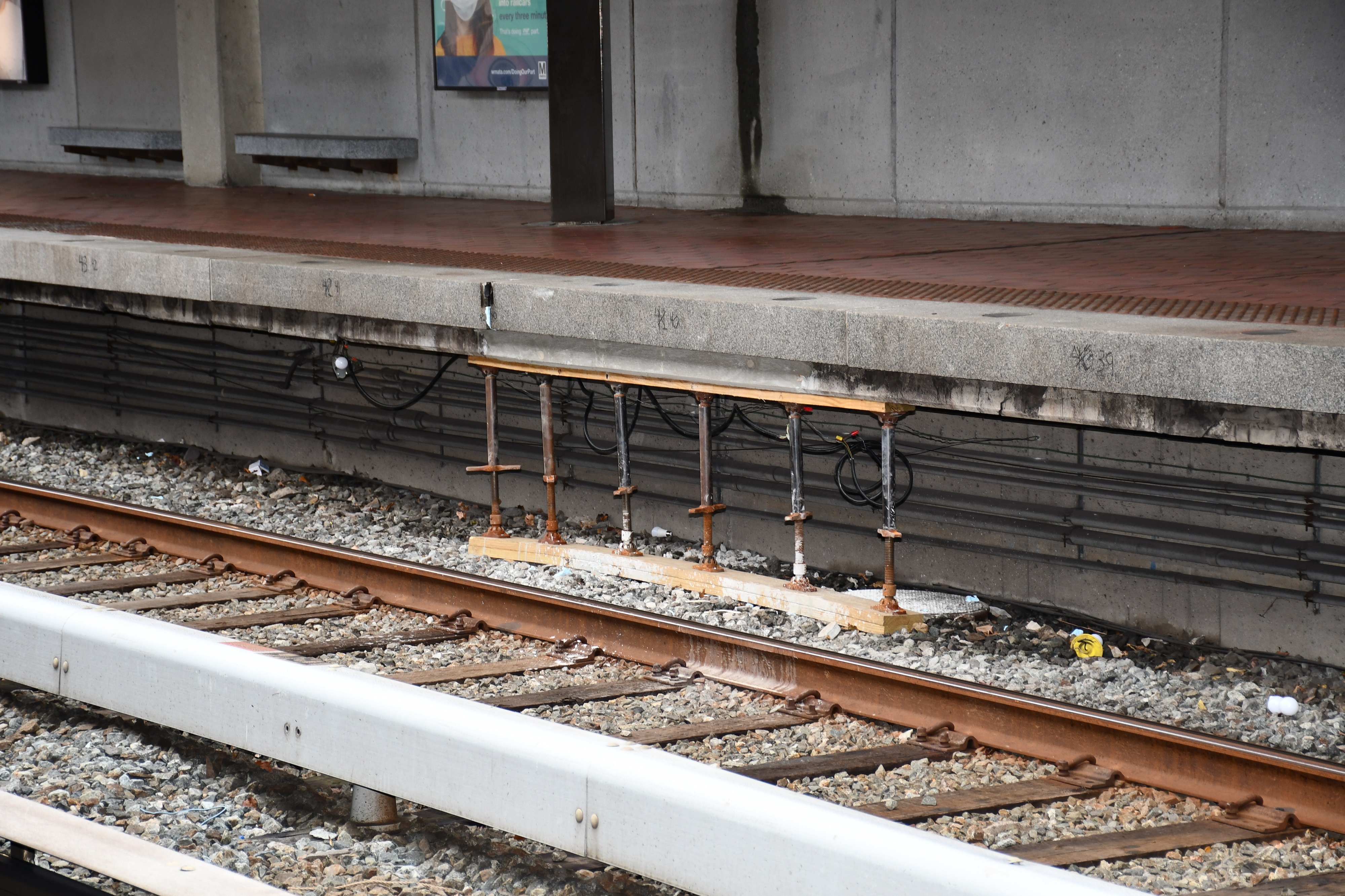 |
- Potomac Yard Station, Sept. 10 – Oct. 22, 2022: Potomac Yard Station construction will require a six-week shutdown of rail service south of Washington National Airport station to build new tracks that “tie-in” the new station with the existing Metrorail system. Engineering, testing, and commissioning needed to integrate the track, power, communications and signal systems into the system will also be conducted during this time. This will be followed by additional testing and training to determine when service can begin.
- Yellow Line Tunnel and Bridge Rehab, beginning Sept. 10, 2022: This work will require a shutdown between Pentagon and L’Enfant Plaza stations, closing the Yellow Line crossing of the Potomac River for seven to eight months. During that time, crews will rehabilitate the Yellow Line Bridge spanning the Potomac River and repair the steel lined tunnels between Pentagon and L’Enfant Plaza stations, both of which date to original construction more than 40 years ago. Exact service plans will be released later this year as construction plans are finalized.
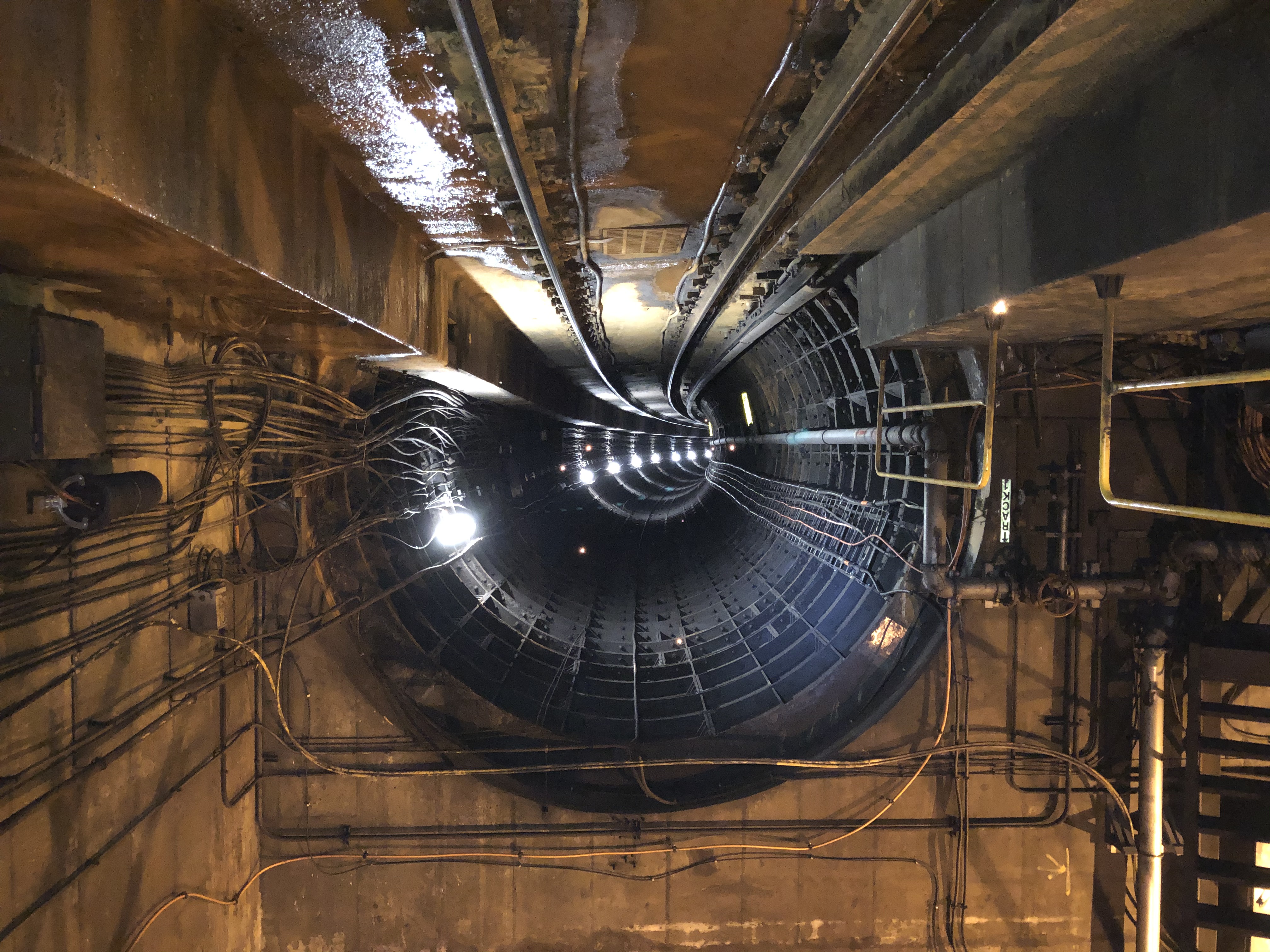 |
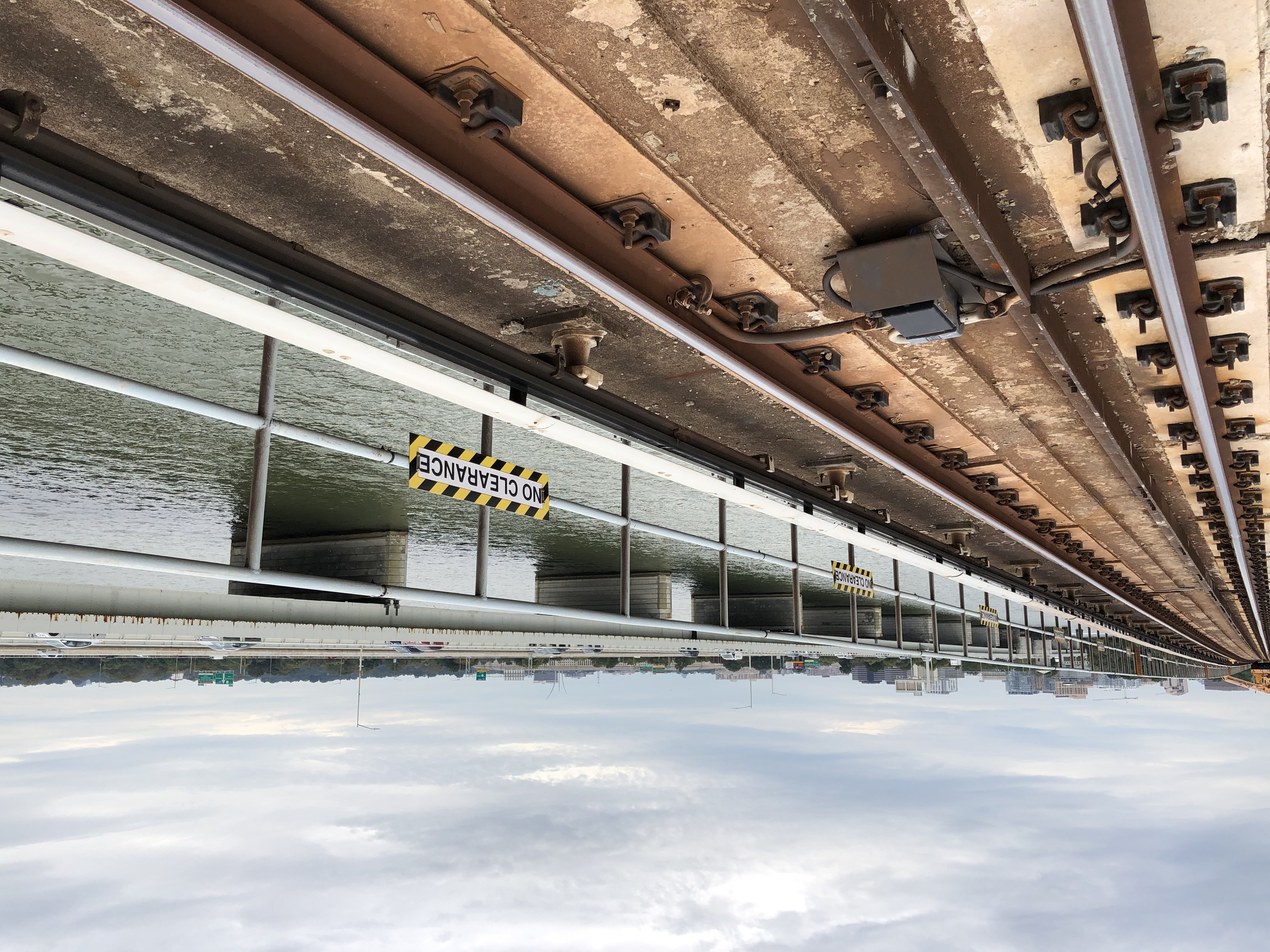 |
Additional work will be completed in 2022 during weekend shutdowns and single tracking, including:
- Replacement of drainage pumping stations and discharge line piping at critical locations, including Medical Center, Wheaton, Metro Center, Federal Triangle and L’Enfant Plaza stations
- Tunnel leak mitigation work between Silver Spring and Forest Glen, and between Tenleytown and Friendship Heights
- Tunnel ventilation pilot project’s final phase between Cleveland Park and Woodley Park; part of Metro’s effort to improve tunnel safety by upgrading the ventilation system and responsive to a National Transportation Safety Board (NTSB) directive following the 2015 smoke incident at L’Enfant Plaza
Construction schedules are tentative and subject to change. As Metro works with the local jurisdictions to plan travel alternatives and communicate with customers and communities, additional information on service impacts, free bus shuttles, supplemental bus service, and other mitigation measures and travel options will be provided to the public approximately three months prior to the start of service impacts. Extensive outreach campaigns are conducted for all major projects to ensure customers and community members are aware of the upcoming changes and can plan ahead.
Metro’s Capital Program
Through a 10-year, $15 billion capital program, Metro is investing in system safety, dependability, and the region’s economy. The capital program totals more than $2 billion in Fiscal Year 2023 and is now one of the largest in the U.S. transit industry. The program advances projects to enhance the customer experience by investing in station and platform improvements, new railcars and buses, upgrading fire-suppression and emergency response systems, replacing, and repairing tracks, tunnels, bridges, signals, and communications systems, rebuilding decades-old bus garages and providing modern customer amenities such as digital passenger information systems. The capital program is supported by dedicated funding from Maryland, Virginia, and the District of Columbia, which allows Metro to reinvest in the local economy, creating jobs and encouraging participation from disadvantaged, minority-owned, and small businesses in the region.
Metro is installing new faregates at rail stations and will begin upgrading fareboxes on Metrobuses in the fall. This investment in new technology means a faster, more efficient and reliable experience for you. As a result, beginning March 1, 2022, SmarTrip cards purchased before 2012 will no longer work and must be replaced.
If you’re using SmarTrip in your mobile wallet, you’re all set – just tap and go.
To accommodate customers SmarTrip card replacements, the Metro Center Sales Office hours of operation have been extended to 8am – 3pm Monday – Friday until further notice. The sales office is located at Metro Center Station – Enter at 12th & F Streets, NW Washington, DC 20005.
Step 1: See if Your Plastic Card Needs to be Replaced.
Check the back of your card. If you don’t see a set of numbers that begins with 0167, you must replace your card.
Step 2: Take Action if Your Plastic Card Needs Replacing.
Have You Registered Your SmarTrip Card to Preserve Your Balance?
Please register your card to ensure your balance stays protected. If you prefer not to register your card, be sure to take a picture or make a copy of the back of your card to note the serial number before proceeding.
If you are not currently riding Metro and don’t have SmartBenefits on your card:
Don’t need your card right away? Mail us your SmarTrip card to have the balance transferred to a new card.
We’ll mail the new card to you within 10 business days to use in the Metro system. Download the Form Here![]() to get started.
to get started.
If you are actively using the Metro system:
Transfer your balance to an eligible SmarTrip card or request a new card here.
If you currently have SmartBenefits on your SmarTrip card:
SmartBenefits participants cannot transfer balances using the mail-in or in-person process. Please use our online balance transfer process to replace your first generation SmarTrip card.
If you need further assistance, see below for our Frequently Asked Questions or call SmarTrip customer service: 1-888-SMARTRIP (1-888-762-7874).
Frequently Asked Questions
My card matches the types that need to be replaced, when do I need to replace it?
We recommend replacing your card as soon as possible to avoid any disruption in the future should you ride at a station that has the new faregates installed. Click here to see the upcoming stations where the faregates will be replaced, as well as a list of the stations with the new faregates and to learn more about the project.
Can I replace my card in-person somewhere?
Visit our Metro Sales Office located at the Metro Center Station to replace your card in-person if your card does not have SmartBenefits. The Metro Sales Office is open Tuesday through Thursday from 8am-12pm.
Can I replace my card online?
If you are a SmartBenefits participant, you can initiate the online card replacement process at any time.
If you are not a SmartBenefits participant, then your first-generation card must be tapped at a faregate, bus fare box, or fare vending machine to complete the balance transfer. For those who aren’t currently riding Metro and do not have SmartBenefits on their card, our mail-in option is the best replacement method as it doesn’t require you to visit a station or bus to complete the balance transfer.
If you do use the online replacement process, then you must use your new card within 30-days to complete the balance transfer. Please plan accordingly.
I have another SmarTrip card that is a newer generation, can I transfer my balance to that card?
Yes, click here to replace your older SmarTrip card and transfer your balance.
What happens if I don’t replace my first generation SmarTrip card?
Older SmarTrip cards that match the formats noted here will not be compatible with our new faregates, so you will be unable to enter or exit the system.
I have SmartBenefits on my first generation SmarTrip card, but I only use my card for vanpool, commuter rail, or commuter bus. Do I still need to replace my card?
If you allocate all your SmartBenefits to a vanpool or for use on commuter rail or commuter bus, then we recommend that you replace your first generation SmarTrip card to keep current with our new technology. However, you will not be required to replace your card if you do not travel on Metro or with one of Metro’s regional partners.
Can I replace my first generation SmarTrip card at Commuter Stores or retail outlets?
Unfortunately, first generation SmarTrip cards can only be replaced in-person at our Metro Sales Office located at the Metro Center Station.
Can I transfer the balance on my first generation SmarTrip card to a mobile SmarTrip card?
If you are actively riding the system and have a SmarTrip card in your mobile wallet, you can transfer the balance of your first generation card to it. First, make sure your mobile SmarTrip card is added to your account at SmarTrip.wmata.com, then transfer your balance to the mobile SmarTrip here.
What if I have a commemorative card and I don’t want to mail it in?
If you are actively riding the system, you can transfer your balance online to another SmarTrip or request to have a new card mailed with your remaining balance. If you have not ridden Metrorail or Metrobus in the last 7 days: whenever you are ready, simply tap your SmarTrip card at any fare vending machine, fare gate, or bus farebox and follow the steps to transfer your balance online to another SmarTrip.
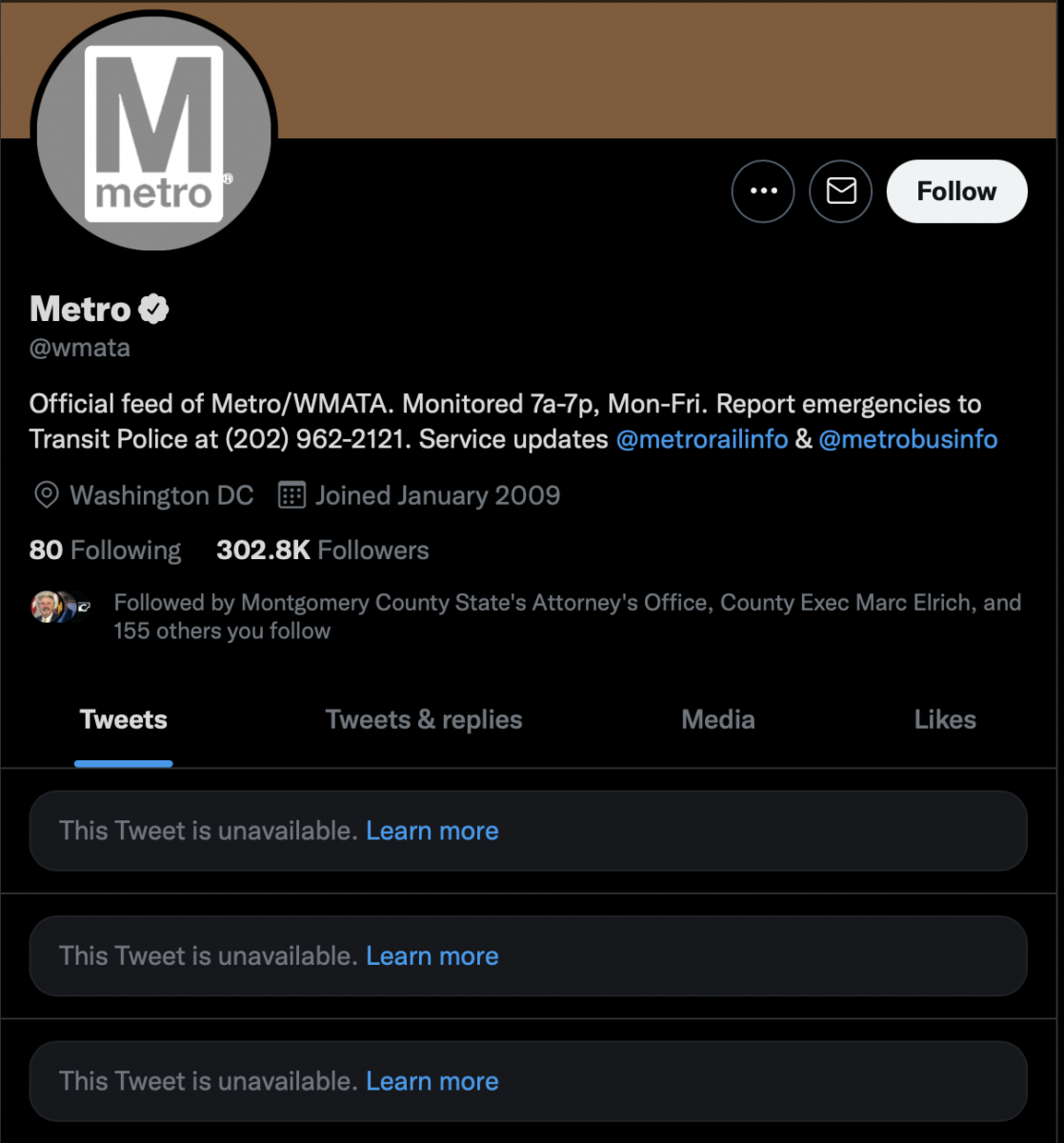
Two of the Washington Metropolitan Area Transit Authority’s Twitter accounts were hacked early this morning, leading to obscene tweets by someone who claimed they were fired as the social media manager for the accounts.
The hacker sent obscene and profanity laced tweets on Metro’s official Twitter page and its Metrorail page in the early morning hours Monday morning. Metro’s main account, @WMATA, was changed from “Metro” to “Blueface Da Bus.” The @metrorailinfo account was also hacked.
As of 8:20 AM the tweets have been deleted, but a few retweets remain, some containing profanity.
Metro officials have released the following statement, acknowledging the hacked accounts and are working to figure out who is responsible:
“We are aware that Metro’s Twitter accounts @WMATA @MetrorailInfo were hacked and obscene posts were made that do not represent Metro’s organization or culture. The posts will be removed, and our account will be secured. We are working to understand who may be responsible for this breach.”
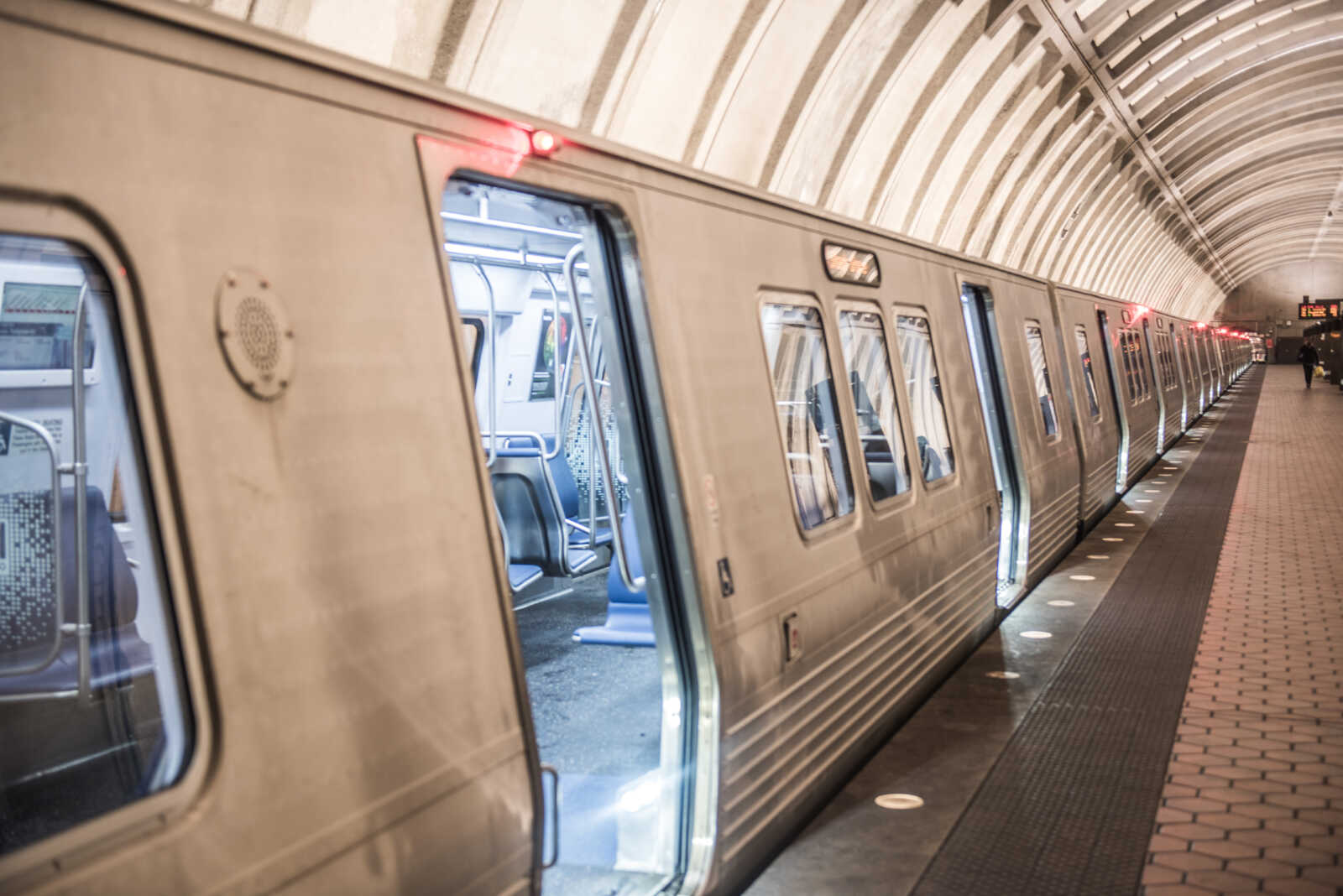
Metro will increase rail service on the Red Line beginning Tuesday, February 22, building on recent weekday service improvements on the Blue, Orange, and Silver lines to provide customers with more frequent and reliable service.
On weekdays, Red Line trains will operate every 10 minutes instead of every 12 minutes. Trains are operating every 20 minutes on all other lines, with trains as frequently as every seven to 10 minutes at stations that are served by multiple lines throughout the system.
“We know every minute counts when you have somewhere to be, so we’re working hard to safely put as many trains into service as possible,” said General Manager and Chief Executive Officer Paul J. Wiedefeld. “We thank our customers for their continued support as we work to do our part to support the region’s recovery.”
Since pausing the return of the 7000-series fleet to focus on root cause analysis, rail maintenance staff have concentrated on restoring more of the legacy fleet (2000-, 3000-, and 6000-series) to improve reliability.
Customers can find the latest service information through website updates, social media posts, digital signage, in-station audio announcements, and alerts. Sign up for MetroAlerts text or email messages to receive the latest service information, follow us on Twitter @MetrorailInfo, or check wmata.com.
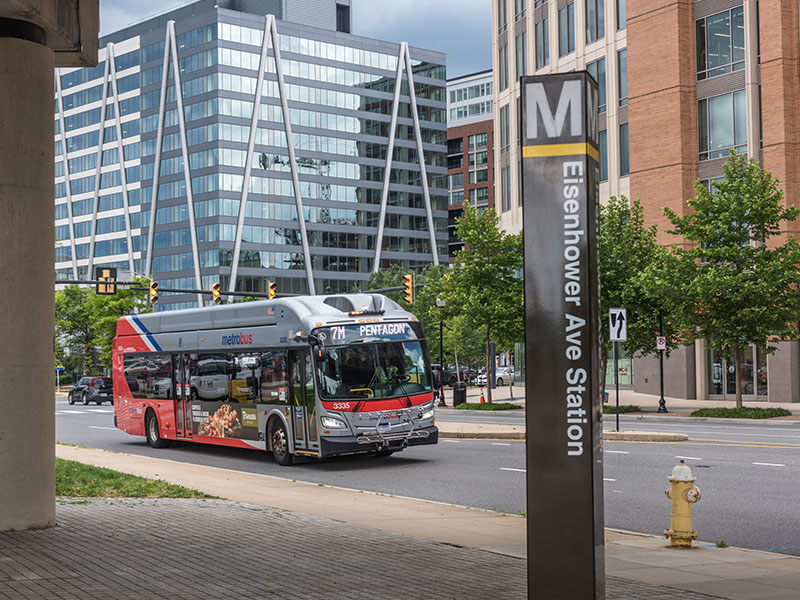
On Presidents Day, Monday, February 21, 2022, Metrorail will operate on a Saturday schedule and Metrobus will run Saturday supplemental service. MetroAccess customers who wish to travel on the holiday may make a reservation; however, subscription trips will be canceled.
Customers are advised to be aware of scheduled track work on the Blue and Yellow lines, closing the six stations south of Reagan National Airport. Free shuttle buses will be provided to/from the closed stations. View the weekend service advisory for additional information.
Service Information
Metrorail: Rail stations will open at 5 a.m. and close at midnight, with trains operating on a Saturday service schedule.
Trains every 12 minutes.
Trains every 24 minutes.
Trains every 20 minutes.
Parking will be free at all Metro owned parking facilities and off-peak fares will be in effect all day.
Metrobus: Buses will run Saturday supplemental service. All routes that normally operate on a Saturday will operate, with additional service on some routes. Schedules vary by routes, check timetables for service information.
MetroAccess: Metro’s paratransit service will operate regularly scheduled hours during the holiday. Subscription trips will be canceled; however, customers traveling on the holiday may book a trip online or by calling 301-562-5360 (TTY 301-588-7535).
Metro Customer Relations: Metro’s customer relations call center will be closed Monday in observance of the holiday. Automated travel information is available 24/7 by calling (202) 637-7000.
Metro has posted a job listing for Metrobus drivers that would allow potential drivers to earn up to $2,500 in signing bonus as well as a starting salary over $50,000 per year that includes overtime opportunities and health and dental insurance (and free transportation on Metrorail add Metrobus).
The job posting can be seen below in full:
Earn up to $2,500 in signing bonus and a rewarding career as Metrobus Driver.
And now, Metro offers up to a $2,500 sign-on bonus.
- Up to a $2,500 sign-on bonus (terms and conditions apply)
- Starting salary of over $50k (with/plus overtime)
- During training: Up to $20/hr.
- After graduation: $25.51/hr.
- Health and dental insurance and other competitive benefits
- Free transportation on Metrorail and Metrobus
Get Started. Stay safe.
At Metro, safety is always top of mind and our precautions against the coronavirus are no exception. We’re conducting more frequent and deeper cleanings around the system, implementing stringent social-distancing protocols and mandatory mask use, and providing personal protective equipment to employees.
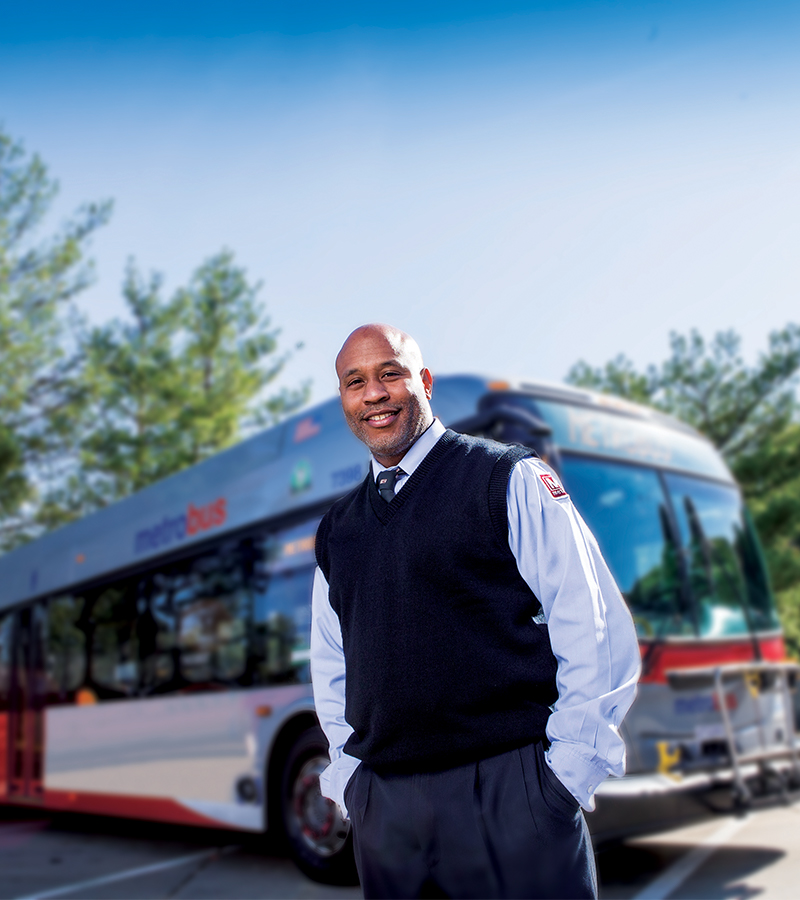
Metrobus Driver Compensation
- Immediate health, dental and life insurance
- 10 week full-time paid training
- Competitive pay:
- Up to $20/hr during training
- $25.51/hr after graduation
- Paid time off
- Retirement benefits
- Tuition reimbursement
- Career advancement opportunities
- Free transportation on Metrorail & Metrobus
- Perks like free uniforms and much more
Metro has releases it Fiscal Year 2023 (FY23) budget page. Here you can find detailed information about Metro’s budget and fare and service proposals. We encourage you to review the proposals and share your feedback by February 15, 2022. Gathering input from our customers, local communities and stakeholders is an integral part of the budget process, and your feedback will factor into our Board of Directors’ final decisions.
Resources
- Take the Survey
- Docket Materials
- FY23 Budget Book (detailed breakdown of Metro’s proposed operating and capital budgets)
Note: The docket contains the Notice of Public Hearing and the proposed fare, rail, bus and Sales Office closure documents.
![]()
Share Your Feedback by 5 p.m. February 15, 2022
Take the survey, submit written comments or upload documents.
Participate in a Public Hearing
Metro will host three Public Hearings that you can participate in virtually or in person.
- To participate by phone, call 855-925-2801 and enter meeting code 8563.
- To participate via video, preregister by emailing [email protected] by 5 p.m. the day before the Public Hearing.
- To participate in person, preregister by emailing [email protected] or calling 202-962-2511 by 5 p.m. the day before the Public Hearing. You can also register on-site.
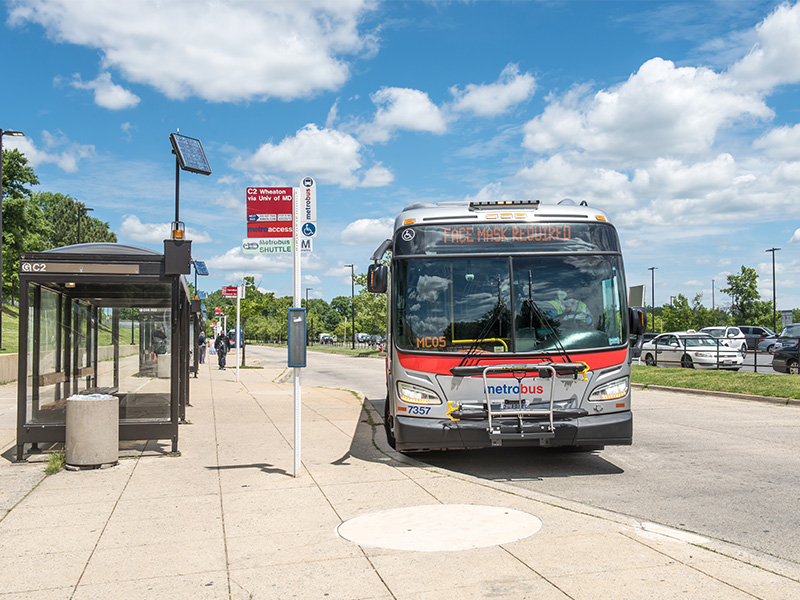
Metro today announced that Metrobus will return to regular weekday service on Monday, February 7. Metrobus has been operating on a modified Saturday schedule, offering approximately 75 percent of normal weekday service, since January 10 due to covid-related staffing shortages.
BOARD OF PUBLIC WORKS APPROVES PURPLE LINE P3 AGREEMENT MODIFICATION WITH NEW DESIGN-BUILD TEAM
Light Rail Line Scheduled to Open in Fall 2026
From the Maryland Department of Transportation:
Baltimore, MD (January 26, 2022) — The Maryland Board of Public Works (BPW) today unanimously approved a modification to the Purple Line Public-Private Partnership Agreement (P3 Agreement) with the Maryland Department of Transportation (MDOT), MDOT Maryland Transit Administration (MDOT MTA), and Purple Line Transit Partners (PLTP) to select Maryland Transit Solutions (MTS) as the new design-build team to complete the Purple Line light rail project. MTS, comprised of Dragados USA Inc. and OHL USA Inc., was selected by PLTP, in coordination with MDOT MTA, after a competitive Request for Proposals process.
The modified P3 Agreement has a cost of $9.284 billion, which includes the $3.4 billion Design-Build cost to begin full-scale construction later this spring with transit operations starting for Marylanders in fall 2026 across the entire system from New Carrollton to Bethesda. The Design-Build cost to complete the Purple Line construction has increased by $1.4 billion from $2 billion to $3.4 billion. Reflecting the post-pandemic market, the total project cost includes rising material costs across the industry, material shortages due to supply chain challenges, a smaller labor force, increases in the insurance market and other factors. Commercial and financial close are anticipated in the coming weeks.
“Despite the challenges over the last several years, we have never lost sight of the benefits of the Purple Line for the residents and businesses in the National Capital Region,” said MDOT MTA Administrator Holly Arnold. “Today’s action is the critical step needed to move the Purple Line from construction into an active light rail line that creates a truly interconnected regional transit system. We wouldn’t be here today without the true partnership with Purple Line Transit Partners and the support of our county, state and federal partners to get this project built.”
“Since we and MDOT MTA selected Maryland Transit Solutions as providing the best value to the people of Maryland, we’ve been working closely with MTS to help them hit the ground running,” said Jane Garvey, chairman, PLTP Board of Directors. “We’re very pleased to resume major construction so the Purple Line can begin serving Maryland travelers as soon as possible.”
BENEFITS OF THE PURPLE LINE
The 16.2-mile, 21-station Purple Line between New Carrollton in Prince George’s County and Bethesda in Montgomery County is a critical infrastructure project expanding transit opportunities in two of the most populated counties in the state. The project will offer convenient east-west transit access for jobs, school, shopping and recreation, and provide connections across the region with links to five branches of Metrorail, three MARC commuter rail lines, Amtrak and a host of bus services.
The Purple Line will relieve vehicle traffic in the National Capital region – one of the most congested areas of the country – and will spur economic growth through community revitalization and job creation. Project construction supports more than 6,000 jobs, with 26% for design services going to small and minority-owned businesses and 22% for construction going to small and minority-owned businesses. The Purple Line also will expand opportunities for Marylanders by MDOT partnering with Montgomery and Prince George’s counties on transit-oriented development and economic development around Purple Line stations.
P3 AGREEMENT SUMMARY
The overall $9.284 billion P3 Agreement to deliver the Purple Line for Marylanders includes several elements: the MTS design-build contract to complete design and construction; Purple Line Transit Operators to operate and maintain the line for 30 years; PLTP to provide management oversight of all elements of the Purple Line for the life of the project; and MDOT to repay debt and equity.
The P3 Agreement modification also shortens, clarifies and streamlines the process for any dispute resolution between parties. Separate and distinct from the dispute resolution process, the P3 Agreement also was modified to remove the right to unconditionally terminate the P3 Agreement for extended delay (utilized by the previous design-build contractor as a basis to leave the project). The right to conditionally terminate for extended delay also has been narrowed. The contractor can conditionally elect to terminate in the case of an extended “force majeure” event that is out of the control of either party, such as war, an act of terrorism, fire and flood, but that is not a unilateral right and the owner can elect to continue in that event.
The P3 model enables the state to leverage investment and expertise from the private sector to design, build, finance, operate and maintain the light rail line. The P3 is an innovative solution to deliver this long-planned link between Prince George’s and Montgomery counties. Private sector funding for the Purple Line allows the state to balance limited Transportation Trust Fund resources and honor infrastructure commitments across the state.
Without the P3 model and its financing and operating components, MDOT MTA would not be able to expand transit into the National Capital Region without incurring additional cost to establish operations outside its core Baltimore service area.
FINANCING THE PURPLE LINE
Factors influencing the updated Purple Line cost in the post-pandemic world would have impacted the project regardless of selected partners or previous bids. Supply chain issues, rising material costs, labor shortages and insurance increases – all of which carry their own costs and also affect industry risk assessment and allocation – could not have been foreseen prior to the pandemic. MDOT, other government agencies, local jurisdictions and private firms across the nation are experiencing significant increases on major projects due to these and other related factors.
Due to all of these factors and the post-pandemic market, the Design-Build cost has increased by $1.4 billion from $2 billion to $3.4 billion to complete the Purple Line construction. The project, which originally was scheduled to be complete in March 2022, will be open for service for Marylanders in Fall 2026.
As outlined in the BPW agenda item, the P3 Agreement cost in 2016 was $5.59 billion, with a BPW approved modification of $250 million in December 2020. Today, BPW approved the additional P3 Agreement modification of $3.444 billion and the revised total projected P3 Agreement cost of $9.284 billion.
PLTP will finance the additional project cost through a combination of debt and equity that will be repaid through availability payments made by the state. PLTP also has agreed to reduce its rate of return – essentially what it gets back on the project – by 20%. The P3 Agreement includes operational and performance targets that must be met by the partners in order to receive the full availability payments.

DESIGN-BUILD CONTRACTOR
As outlined above, the Design-Build cost has increased by $1.4 billion from $2 billion to $3.4 billion to complete the Purple Line construction, reflecting the post-pandemic market with rising material costs across the industry, material shortages due to supply chain challenges, a smaller labor force, increases in the insurance market and other factors. The project, which originally was scheduled to be complete in March 2022, will open for service for Marylanders in Fall 2026.
As the new design-build contractor, MTS brings strong leadership experience and a track record of completing major and complex infrastructure and delivering transit projects. MDOT is confident MTS will deliver a completed project in the shortest time possible.
MTS is comprised of Dragados USA Inc. and OHL USA Inc. Dragados comes to the Purple Line with immense experience in delivering transit systems. Among their notable projects are the $2.4 billion Los Angeles International Airport Automated People Mover and three light rail projects in Canada with a combined value of $5.5 billion. Dragados was ranked sixth on Engineering News Record’s 2020 Top Transportation Contractors List. OHL has more than a century of infrastructure construction experience and is ranked number 15 on Engineering News Record’s 2020 Top 50 Domestic Heavy Contractors List.
DESIGN-BUILD CONSTRUCTION SCHEDULE
MTS will begin mobilizing staff and equipment to begin full-scale construction later this spring. The team’s updated construction schedule will enable the Purple Line to begin revenue service in fall 2026 and will allow for the entire light rail line to open at the same time instead of opening in phases as proposed previously. This approach will enable the Purple Line to provide seamless, system-wide benefits from day one.
Following Financial and Commercial Close in the coming weeks, MTS will start full-scale construction in spring 2022.
The Light Rail vehicles are continuing in production in Elmira, N.Y. Of the 28 Light Rail vehicles, eight are complete and available for shipment now; an additional eight are complete and are undergoing static testing; and another eight are being assembled now.
In fall 2023, Light Rail vehicles are scheduled to arrive at the Glenridge Operations & Maintenance Facility in Prince George’s County.
In summer 2024, the Test Track is expected to be complete for local testing and operator training.
In winter 2025, construction is scheduled to have progressed enough to allow systemwide testing and commissioning activities will be ongoing.
In fall 2026, revenue service is scheduled to begin on the full line with all 21 stations operational at one time. This approach will enable the Purple Line to provide seamless, system-wide benefits to Marylanders from day one.

BPW APPROVES ADDITIONAL CONTRACTS TO CONTINUE MDOT MTA WORK STARTED DURING THE DESIGN-BUILD SEARCH
As outlined in today’s BPW P3 Agreement agenda item, PLTP and MDOT MTA pursued an aggressive schedule to select a new design-build contractor. While procurements of this magnitude often take 18 months to two years to complete, the replacement of the Purple Line design-build contractor was accomplished in just more than a year.
On a parallel path, MDOT MTA managed more than 150 Purple Line contracts and oversaw several key milestones that benefit the project construction, substantially reducing risk for the new design-build contractor. This work advanced design components, secured critical stormwater management permits and completed numerous outstanding utility relocations with approximately 66% of all project utility relocations now complete. These accomplishments will greatly assist the new design-build contractor as they begin full-scale construction.
While most of the 150 plus Purple Line contracts are being assumed by MTS, BPW today also approved five new MDOT MTA contracts totaling $15.4 million in separate agenda items to allow current unfinished work including utility relocation, concrete and other construction work to be completed. In addition, BPW approved a 48-month, $15 million contract modification for the General Engineering Consultant’s continued technical oversight of this design and construction work.
MDOT MTA is one of the largest multi-modal transit systems in the United States. MDOT MTA operates LocalLink Bus service, Commuter Bus, Light RailLink, Metro SubwayLink, MARC Train service and a comprehensive Mobility paratransit system. MDOT MTA’s goal is to provide safe, efficient and reliable transit across Maryland with world-class customer service. As a participating agency in APTA’s Health and Safety Commitment Program, MDOT MTA is dedicated to keeping our employees and passengers safe throughout the COVID-19 pandemic.
”Shady Grove and Rockville stations have reopened!” proclaimed Metro in a recent post on its website and social media.
Per Metro, “Here is everything you need to know about service at the reopened stations and fun facts about the project.”
- Brighter, more efficient LED lights
- New digital screens for passenger information
- Upgraded speakers for station announcements
At both stations, customers will experience new, modernized faregates with larger displays and enhanced safety features.
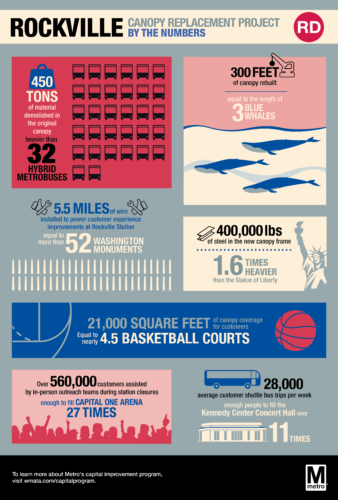
Travel Tips
- Red Line service has resumed at Shady Grove and Rockville stations.
- Metrobus and RideOn will continue to stop at their current temporary locations at Rockville Station until February.
- SmarTrip cards purchased before 2012 do not work with the new faregates at both stations — learn how to get a replacement card.
- Some parking remains temporarily closed at both stations.
- Federal law requires wearing a face mask on public transit.
Five things to know now that Shady Grove and Rockville stations have reopened:
1. Red Line service resumes
- Learn about Metrorail service levels and hours and use Trip Planner to plan your upcoming trip.
- Free shuttle bus service will not be offered after January 15.
2. Buses will continue to stop at their temporary locations at Rockville Station until February.
- The West Kiss & Ride lots at Shady Grove and Rockville stations will remain closed while the construction site is cleaned up. Use the East Kiss & Ride lots for passenger pick up/drop off.
- Rockville Station customers will experience ongoing parking closures as Metro continues to improve the station’s parking facilities.
- Keep your nose and mouth covered on trains, buses and in stations.
